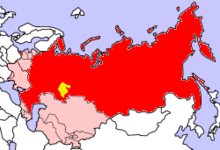Bashkir Autonomous Soviet Socialist Republic
The Bashkir ASSR ( Russian Башкирская АССР ; Bashkir Autonomous Soviet Socialist Republic , Russian Башкирская Автономная Советская Социалистическая Республика ; Bashkir Башҡорт Автономиялы Совет Социалистик Республикаһы ) was the first ethnic autonomous Soviet republic in the Russian Soviet Federative Socialist Republic (RSFSR). It existed from March 23, 1919 until the collapse of the Soviet Union on December 26, 1991. The titular nation was the Bashkirs , a Muslim Turkic-speaking ethnic group .
location
The 142,947 km² Bashkir ASSR was located on the extreme eastern edge of Europe, west of the Ural Mountains , comprised the southern Urals and its western foreland and corresponds to the area of today's Bashkortostan within Russia . On the territory of the Bashkir ASSR, the Ufa governorate existed as an administrative unit in the Russian Empire until 1919 .
The capital of the ASSR was Sterlitamak from 1920 to 1922 and Ufa from 1922 to 1991 .
population
The population of the republic in 1989 was 3,943,113 (corresponding to 28 inhabitants per km²). The Bashkirs made up only 21.9% of the population in 1989, 39.3% were Russians and 28.4% were Tatars .
- Population development
| year | Residents |

|
|---|---|---|
| 1926 | 2,665,836 | |
| 1939 | 3,158,969 | |
| 1959 | 3,341,609 | |
| 1970 | 3,818,075 | |
| 1979 | 3,844,280 | |
| 1989 | 3,943,113 |
Note: census data
Second World War
During the Great Patriotic War , over 100 factories, dozen hospitals, several large industrial plants, many government agencies, a number of scientific institutes and 278,000 people were evacuated to the Bashkir ASSR. The oil fields that were discovered in Bashkiria in the 1920s were important for the conduct of the war. The city of Ischimbai was established in 1932 as an oil workers' settlement after Bashkiria's first oil was discovered there. 280 Red Army soldiers born in Bashkiria received the highest military honor Hero of the Soviet Union .
In Ufa there was a prisoner of war camp 319 for German prisoners of war of World War II.
economy
In the post-war period, the exploitation and processing of Bashkiria's oil reserves played the greatest role in the economy. The Bashkir ASSR had rich oil and gas reserves , as well as copper , gold , iron , manganese , bauxite and lignite . The most important industrial cities were and are Ufa , Sterlitamak , Salawat and Belorezk .
Heads of government
- 1917–1919: Junus Julbarissowitsch Bikbow (1883–1942)
- 1919: Mstislaw Alexandrowitsch Kulajew (1873-1958)
- 1919–1920: Gali Kamaletdinowitsch Schamigulow (1890–1959)
- 1921–1925: Mullajan Dawletschinowitsch Chalikow (1894–1937)
- 1925–1930: Aksan Baimursitsch Muchametkulow (1895–1938)
- 1930–1937: Sinatulla Gisatowitsch Bulaschew (1894–1938)
- 1937–1940: Fasyl Walijachmetowitsch Schagimardanow (1906–1968)
- 1940–1946: Sabir Achmedjanowitsch Wagapow (1904–1993)
- 1946–1951: Nassyr Rafikowitsch Urasbajew (1902–1981)
- 1951–1962: Walej Gabejewitsch Nabiullin (1914–1982)
- 1962–1986: Sekerija Scharafutdinowitsch Aknasarow (1924–2000)
- 1986–1992: Marat Parissowitsch Mirgasjamow (* 1942)
After the dissolution of the Soviet Union
Since October 11, 1991, the Bashkir ASSR has been recognized as the sovereign Bashkir Soviet Socialist Republic.
Since February 25, 1992 the Republic of Bashkortostan or Bashkortostan has been referred to as a federation subject with sovereign rights of Russia, but the term Soviet Bashkiria (historical, unofficial) is still used between Russian speakers .
See also
Web links
- Article Bashkir Autonomous Soviet Socialist Republic in the Great Soviet Encyclopedia (BSE) , 3rd edition 1969–1978 (Russian)
- История Башкирского народа , History of Bashkiria (Russian)
- Official website of Bashkortostan (Russian)
Individual evidence
- ↑ Bashkir Autonomous Soviet Socialist Republic in the Great Soviet Encyclopedia , 1950, p. 347 (Russian)
- ↑ Jonathan D. Smele: Historical Dictionary of the Russian Civil Wars, 1916-1926 . Ed .: Rowman & Littlefield Publishers. tape 2 , 2015, ISBN 1-4422-5280-4 , pp. 179 .
- ^ The Encyclopedia Americana . tape 30 . Grolier, Danbury 1984, ISBN 0-7172-0115-5 , pp. 310 .
- ↑ List of awardees on warheroes.ru with the date of the award (Russian)
- ↑ Алфавитный указатель Героев Советского Союза по Республике Башкортостан (German: Alphabetical Directory of Heroes of the Soviet Union in the Republic of Bashkortostan). Retrieved July 16, 2020 (Russian).
- ↑ Erich Maschke (Hrsg.): On the history of the German prisoners of war of the Second World War. Gieseking, Bielefeld 1962–1977.
- ↑ ? Башкортостан или Башкирия / Юлдаш Юсупов - Проект ЗАМАН - первая некоммерческая информационная площадка в Башкортостане, которая объединяет людей науки и культуры (German: Bashkortostan or Bashkiria) on YouTube , February 19 2020 (Yuldash Yusupov, ZAMAN project - the first Non-profit information platform in Bashkortostan that brings people from science and culture together on YouTube (Russian).
- ↑ Adelina Minibajewa (Аделина Минибаева): Можно ли говорить "Башкирия», и оправдан ли гнев части жителей республики по этому поводу ? (German: Can one say “Bashkiria” and is the anger of part of the inhabitants of the republic justified in this regard?). In: UfaTime.ru. Retrieved July 16, 2020 (Russian).





